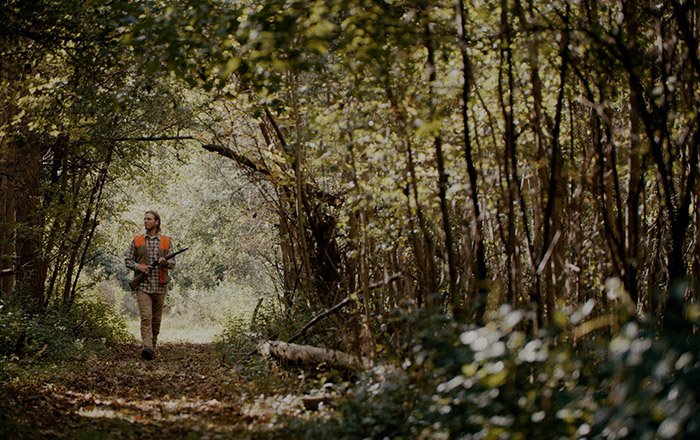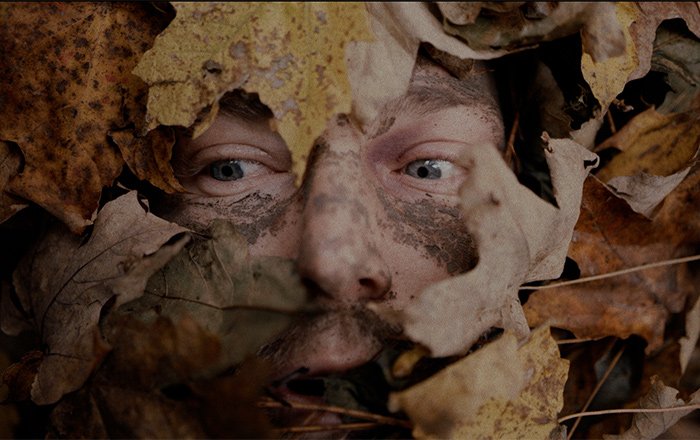[Film Review] Deep Woods (2022)

Deep Woods is an indie thriller with an intriguing premise, but ultimately falls a little short in execution.
On paper, it’s a good time: a rich businessman accidentally stumbles onto an illegal marijuana farm during a hunting trip, and is chased away by a cartel gunman, turning his weekend getaway into a cat-and-mouse thriller set in the pine forest of the Northwoods.
In Deep Woods, we follow Ty, the aforementioned businessman, and his old college roommate Nick, a Native American Game Warden who Ty seeks out to be his guide to the wilderness. Ty wants to become an outdoorsman to “see nature while it’s still there,” but also to try to feel alive again, away from the hustle and bustle of whatever high-powered executive job is funding this excursion. Nick is his gateway to the wilderness, both literally and metaphorically. Before heading into the woods, Nick takes Ty to see his son perform in a War Dance and tells him the folklore of the Wendigo. We’re leaving Ty’s world behind and entering Nick’s - dangerous, primal, possibly supernatural.
LISTEN TO OUR HORROR PODCAST!
![[Ghouls Podcast] You Are Not My Mother with Ygraine Hackett-Cantabrana](https://images.squarespace-cdn.com/content/v1/5fe76a518d20536a3fbd7246/1672840165939-VP0CIKOM4KPX67JLNHDB/_PODCAST+NO+IMAGE+2023+EP+6.jpg)
The film’s relationship with Native Americans is one that doesn’t quite feel fleshed out. It doesn’t help that, moments after this scene, Nick is called a racial slur by a logger at a dive bar, who is then befriended by Nick and ultimately becomes a hero that saves the day. The other hero is a Native American trapper Ty finds in the woods, who tends to Ty’s wounds and dispenses advice. It’s dangerously close to the “magical Native American” trope.
It’s no surprise that Deep Woods comes from a first-time filmmaker: Steve Laughlin, a successful advertising executive in Chicago. His career in advertising shows his strong eye for visuals, creating beautiful images from scene to scene. But the storytelling of Deep Woods is lacking, with characters feeling like concepts more than fully fleshed out human beings. In advertising, you can evoke feeling by just showing a few glimpses of someone and letting consumers fill in the gaps; with filmmaking, we need more than just hints at the themes or concepts. With a more experienced filmmaker, some of the ideas that Laughlin is trying to evoke could have been executed more strongly.

That brings us to the cartel. After splitting off from Nick, Ty and his hunting dog stumble onto a marijuana farm. He’s shot at, his hunting dog is killed, and he tries to escape back through the woods. The gunman, Enrique, and a drone operator are the only two hired guns working at the grow-op and they immediately have a single-minded focus on tracking down and killing Ty. The film is trying to keep a piece of the plot a mystery, only revealing its hand about where the threat is really coming from at the end of the film, but as a result, the stakes feel small. You don’t feel like a ruthless cartel is about to turn up at any minute, nor that the group hunting Ty seems to have any idea what they’re doing. Enrique doesn’t feel particularly dangerous (he’s just one man!) and Ty, despite not being a skilled survivalist, manages to outsmart him more than once. The odds are against Ty and he gets by mostly on luck and chance. It’s hard to feel pulled into his peril when the peril doesn’t feel real.
That’s not to say Deep Woods is a bad movie. It’s entertaining, even if the reveals are easily guessed and the tension is lighter than it should be. It’s well-shot and competently made, and many of the actors are doing their best to pull you in. With a tighter script, this could have been a real gem of an indie. Instead, it’s an okay film that had a lot more potential.



![[Ghouls Podcast] The Wicker Man with Lakkaya Palmer](https://images.squarespace-cdn.com/content/v1/5fe76a518d20536a3fbd7246/1672839898764-VIYDC7ZD8QTBCGK562NL/_PODCAST+NO+IMAGE+2023+EP+7.jpg)
![[Ghouls Podcast] Noroi: The Curse & Perfect Blue with Sarah Miles and Ygraine Hackett-Cantabrana](https://images.squarespace-cdn.com/content/v1/5fe76a518d20536a3fbd7246/1682950816911-7ZCMPP8H0BSUPCPZYQ07/_PODCAST%2BNO%2BIMAGE%2B2023%2BEP%2B8.jpg)
![[Ghouls Podcast] Dark Water with Melissa Cox and Rebecca McCallum](https://images.squarespace-cdn.com/content/v1/5fe76a518d20536a3fbd7246/1672839939630-BLPIHIDVRJE9FC1A9BRZ/_PODCAST+NO+IMAGE+2023+EP+9.jpg)
![[Ghouls Podcast] Final Destination with Jenn Adams and Rebecca McCallum](https://images.squarespace-cdn.com/content/v1/5fe76a518d20536a3fbd7246/1672839916928-KK9CTT0OAKACXLGYA9DX/_PODCAST+NO+IMAGE+2023+EP+10.jpg)
![[Ghouls Podcast] Alien with Tim Coleman and Rebecca McCallum](https://images.squarespace-cdn.com/content/v1/5fe76a518d20536a3fbd7246/1672839878802-LR40C39YGO3Q69UCCM62/_PODCAST+NO+IMAGE+2023+EP+11.jpg)
![[Ghouls Podcast] Horror Literature with Nina Book Slayer & Alex Bookubus](https://images.squarespace-cdn.com/content/v1/5fe76a518d20536a3fbd7246/1672840273346-ASHBRDHOKRHMGRM9B5TF/_PODCAST+NO+IMAGE+2023+EP+12.jpg)
![[Ghouls Podcast] Halloween Special: 5 Horror Films to Watch This Halloween with Joshua Tonks and Liz Bishop](https://images.squarespace-cdn.com/content/v1/5fe76a518d20536a3fbd7246/1672840351086-2AWFIS211HR6GUY0IB7I/_PODCAST+NO+IMAGE+2023+EP+13.jpg)
![[Ghouls Podcast] Soho Horror Film Preview with Hannah Ogilvie & Caitlyn Downs](https://images.squarespace-cdn.com/content/v1/5fe76a518d20536a3fbd7246/1672840411619-IP54V5099H6QU9FG4HJP/_PODCAST+NO+IMAGE+2023+EP+14.jpg)
![[Ghouls Podcast] The Borderlands (2013) with Jen Handorf](https://images.squarespace-cdn.com/content/v1/5fe76a518d20536a3fbd7246/1672839985316-KPLOVA9NGQDAS8Z6EIM9/_PODCAST+NO+IMAGE+2023+EP+15.jpg)
![[Ghouls Podcast] Soho Horror Film Review with Hannah Ogilvie & Caitlyn Downs](https://images.squarespace-cdn.com/content/v1/5fe76a518d20536a3fbd7246/1672840392291-XQGQ94ZN9PTC4PK9DTN1/_PODCAST+NO+IMAGE+2023+EP+16.jpg)
![[Ghouls Podcast] Krampus (2015) with Megan Kenny & Rebecca McCallum](https://images.squarespace-cdn.com/content/v1/5fe76a518d20536a3fbd7246/1672839790368-VYX6LIWC5NVVO8B4CINW/_PODCAST+NO+IMAGE+2023+EP+17.jpg)
![[Ghouls Podcast] Terrifier (2016) & Terrifier 2 (2022) with Janine Pipe](https://images.squarespace-cdn.com/content/v1/5fe76a518d20536a3fbd7246/1674478017541-0DHH2T9H3MVCAMRBW1O1/_PODCAST+NO+IMAGE+2023+EP+4+%282%29.jpg)
![[Ghouls Podcast] The Loved Ones (2009) with Liz Bishop](https://images.squarespace-cdn.com/content/v1/5fe76a518d20536a3fbd7246/1676369735666-56HEK7SVX9L2OTMT3H3E/GHOULS+PODCAST+THE+LOVED+ONES.jpg)
![[Ghouls Podcast] Ghouls Watch: Severance, Run Sweetheart Run, Splice & more](https://images.squarespace-cdn.com/content/v1/5fe76a518d20536a3fbd7246/1677589685406-YZ9GERUDIE9VZ96FOF10/Copy+of+GHOULS+PODCAST+THE+LOVED+ONES+%281%29.jpg)
![[Ghouls Podcast] Good For Her Horror Film Recommendations](https://images.squarespace-cdn.com/content/v1/5fe76a518d20536a3fbd7246/1678634497037-W441LL37NW0092IYI57D/Copy+of+Copy+of+GHOULS+PODCAST+THE+LOVED+ONES.jpg)
![[Ghouls Podcast] 5 Coming-of-Age Horror Film Recommendations](https://images.squarespace-cdn.com/content/v1/5fe76a518d20536a3fbd7246/1681418402835-EMZ93U7CR3BE2AQ1DVH4/S2+EP5.png)
![[Ghouls Podcast] Ghouls Watch: Deathproof, Child’s Play, Ghostwatch & more](https://images.squarespace-cdn.com/content/v1/5fe76a518d20536a3fbd7246/1682447065521-DWF4ZNYTSU4NUVL85ZR0/ghouls+watch.png)
![[Ghouls Podcast] The Ruins (2008) with Ash Millman & Zoë Rose Smith](https://images.squarespace-cdn.com/content/v1/5fe76a518d20536a3fbd7246/1684076097566-BE25ZBBECZ7Q2P7R4JT4/The+Ruins.jpg)
![[Ghouls Podcast] Ghouls Watch: The Devil’s Candy, Morgana, Dead Ringers & more](https://images.squarespace-cdn.com/content/v1/5fe76a518d20536a3fbd7246/1685284429090-5XOOBIOI8S4K6LP5U4EM/%5BMay%5D+Ghouls+Watch+-+Website.png)
![[Ghouls Podcast] 3 Original vs. Remake Horror Films with Rebecca McCallum & Kim Morrison](https://images.squarespace-cdn.com/content/v1/5fe76a518d20536a3fbd7246/1685286663069-0Q5RTYJRNWJ3XKS8HXLR/%5BJune%5D+Original+vs.+Remake+Horror+Films.png)
![[Ghouls Podcast] Ghouls Watch: Bones and All, Suitable Flesh, The Human Centipede & more](https://images.squarespace-cdn.com/content/v1/5fe76a518d20536a3fbd7246/1687855203348-7R2KUSNR6TORG2DKR0JF/%5BJune%5D+Ghouls+Watch+-+Website.jpg)
![[Ghouls Podcast] Ghouls Watch: Body Horror Recommendations](https://images.squarespace-cdn.com/content/v1/5fe76a518d20536a3fbd7246/1691238687847-L9U434I1U4HZ3QMUI3ZP/%5BJuly%5D+Ghouls+Watch+-+Website+%281%29.jpg)
![[Ghouls Podcast] Antiviral, Possessor & Infinity Pool with Zoë Rose Smith, Amber T and Iona Smith](https://images.squarespace-cdn.com/content/v1/5fe76a518d20536a3fbd7246/1691238787263-XYRKXW2Z7RWI9AY2V2GX/%5BJuly%5D+Antiviral%2C+possesoor+and+infinity+pool+%281%29.jpg)
![[Ghouls Podcast] Tender Is The Flesh with Zoë Rose Smith, Bel Morrigan and Liz Bishop](https://images.squarespace-cdn.com/content/v1/5fe76a518d20536a3fbd7246/1693769261264-MS4TS4Z4QC1N15IXB4FU/Copy+of+%5BJuly%5D+Antiviral%2C+possesoor+and+infinity+pool.jpg)
![[Ghouls Podcast] Ghouls Watch: Bucket List of the Dead, Blood Drive, Candy Land & more](https://images.squarespace-cdn.com/content/v1/5fe76a518d20536a3fbd7246/1696261000263-58VQFOVWPE363OFGP7RF/GHOULS+WATCH.jpg)





















![[Film Review] Sympathy for the Devil (2023)](https://images.squarespace-cdn.com/content/v1/5fe76a518d20536a3fbd7246/1697186986143-QDVLQZH6517LLST682T8/Screenshot+2023-10-13+at+09.48.52.png)
![[Film Review] V/H/S/85 (2023)](https://images.squarespace-cdn.com/content/v1/5fe76a518d20536a3fbd7246/1697455043249-K64FG0QFAFVOMFHFSECM/MV5BMDVkYmNlNDMtNGQwMS00OThjLTlhZjctZWQ5MzFkZWQxNjY3XkEyXkFqcGdeQXVyMTUzMTg2ODkz._V1_.jpg)
![[Film Review] Kill Your Lover (2023)](https://images.squarespace-cdn.com/content/v1/5fe76a518d20536a3fbd7246/1697465940337-T55VQJWAN4CHHJMXLK32/56_PAIGE_GILMOUR_DAKOTA_HALLWAY_CONFRONTATION.png)
![[Film Review] Shaky Shivers (2022)](https://images.squarespace-cdn.com/content/v1/5fe76a518d20536a3fbd7246/1696442594997-XMJSOKZ9G63TBO8QW47O/Screenshot+2023-10-04+at+18.59.33.png)
![[Film Review] Elevator Game (2023)](https://images.squarespace-cdn.com/content/v1/5fe76a518d20536a3fbd7246/1696440997551-MEV0YZSC7A7GW4UXM5FT/Screenshot+2023-10-04+at+18.31.42.png)
![[Film Review] A Wounded Fawn (2022)](https://images.squarespace-cdn.com/content/v1/5fe76a518d20536a3fbd7246/1695484054446-7R9YKPA0L5ZBHJH4M8BL/Screenshot+2023-09-23+at+16.42.24.png)
